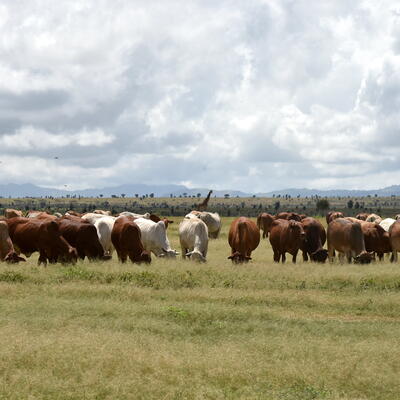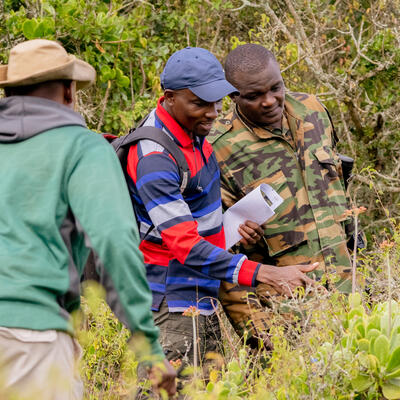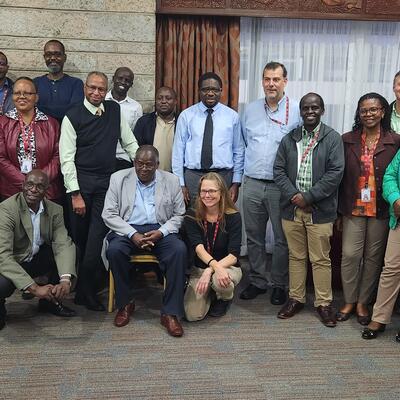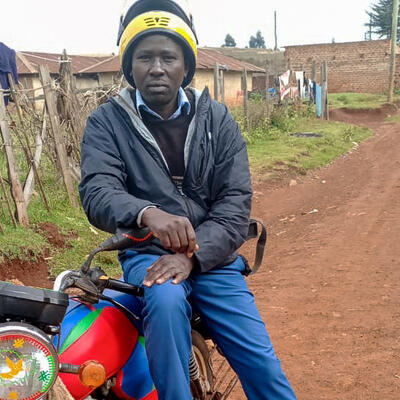
ILRI fetes long-serving Kapiti staff
On 21 June 2024, the International Livestock Research Institute (ILRI) presented long-service awards to 16 staff of the institute’s Kapiti Research Station and Wildlife Conservancy. The awardees have worked at the conservancy for between 10 and 35 years.
The award ceremony, led by ILRI director of people and organizational development Stella Kiwango, underscored the value placed on staff contributions at the institute. ILRI director general Appolinaire Djikeng presented the awards.
Spanning 32,000 acres, the Kapiti station is located in Machakos County, southern Kenya, 60 km away from ILRI’s Nairobi campus. It serves as a centre for animal research and conservation as well as a livestock ranch.
Alexander Kyalo, Kapiti’s longest serving employee, joined the team in 1988 as a fencer. A month later, he moved to the livestock department as a livestock assistant, helping in the coordination of the herding team. Additionally, he takes part in research and assists in livestock spraying.
‘When I started work here, Kapiti was not as it is now. The conditions then were much harsher, and I often wondered if I would survive. My fulfillment comes from the skills I have gained through experience, particularly in livestock care. I appreciate and acknowledge management’s role and their significant impact on my journey at Kapiti,’ Kyalo said.
James Muthai, the second-longest serving staff, has been at Kapiti for 25 years. His journey started in 1998 as a shepherd and after 8 months, he transitioned to the dairy team. Over the years, he has worked in various departments before becoming the maintenance supervisor. Reflecting on his career, Mungai says, ‘Loving your work is the beginning of everything’.
Others feted were Gideon Maingi, for 20 years of service, as well as Dominic Mbevi, Simon Kyalo, Samuel Maingi, John Keli and Solomon Maingi, each of whom has served for 15 years. Those who have worked at the conservancy for 10 years are Elic Murithi, Peter Kioko, Anthony Mutuku, Abdi Dongo, Patrick Mutula, Joseph Wambua and Martin Muthoka.
During the award ceremony, the ILRI director expressed his gratitude to the staff for their commitment to maintaining the conservancy. He shared his reflections on the tranquility and significance of Kapiti, not just as a habitat for livestock and wildlife, but as a crucial site in combating climate change.
‘This property is unique in the world. It's protecting places like this that will help us tackle climate change. This is not just a place where we have animals; Kapiti’s involvement in climate change initiative activities, such as assessing nitrogen loss pathways in semi-arid livestock systems in east Africa, emphasizes its global importance,’ said Djikeng.
Ranch manager, Nehemiah Kimengich, commended the long-serving staff for their resilience, hard work and dedication, all of which have been instrumental in maintaining the well-being of Kapiti. The award ceremony was a testament to the dedication and hard work of the 16 recipients, whose contributions have been instrumental in making Kapiti a cornerstone of research and conservation in livestock management in Kenya and beyond.
Learn more about Kapiti here.
You may also like

ILRI News
How much carbon can Kenyan grasslands store in their soils? Insights from the CarboGrass Project

HABITAT- Farmer workshops on biodiversity and pasture biodiversity assessment on highland dairy farms
Related Publications

Biodiversity threats and socio-ecological dynamics in Chebera Churchura National Park: A one health approach
- Guadu, T.
- Abera, B.
- Tesfay, K.
- Berhane, A.
- Tafese, A.
- Solomon, T.
- Debebe, B.
- Getachew, M.
- Shibabaw, A.
- Araba, A.
- Abdurahman, M.
- Yadeta, W.
- Tadesse, Y.
- Ayemeta, T.
- Knight-Jones, Theodore J.D.
- Mor, Siobhan M.
- Mereta, S.T.
- Kaba, M.
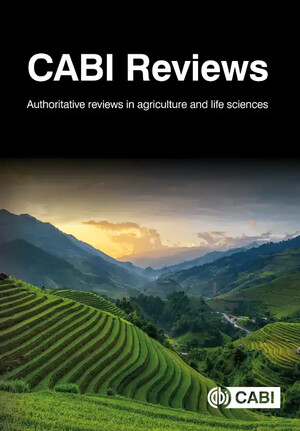
Locally led adaptation and climate-smart agriculture: A review of two conceptual framings of responses to climate change in LMICs
- Habermann, Birgit

Navigating COP16’s digital sequence information outcomes: What researchers need to do in practice
- Muñoz-García, M.
- Bansal, K.C.
- Bao, Y.
- Brinkley, S.C.
- Buzan, E.
- Castle, D.
- Cepeda-Hernández, M.L.
- Correard, S.
- Crawford, A.J.
- Silva, J.M. da
- Silva, M. da
- Ekpe, S.
- El Fahime, E.
- Engelhardt, A.
- Faggionato, D.
- Haas, A.S.
- Hautea, D.M.
- Hossaert-McKey, M.
- Mazzoni, C.J.
- Jaspars, M.
- Katee, Sally
- Kress, J.
- Kwarteng, A.
- Lijtmaer, D.A.
- Lee, S.
- Noriega, I.L.
- Lyal, C.
- Maharaj, G.
- McCartney, A.M.
- Miano, D.
- Mulema, J.
- Oliveira, G.
- Omesa, F.O.
- Orozco, P.
- Overmann, J.
- Poetsch, A.
- Prat, C.
- Raposo, D.S.
- Restrepo, S.
- Rhoden, F.
- Rouard, M.
- Serepa-Dlamini, M.H.
- Aguilera, M.A.S.
- Suzuki, M.
- Tiambo, Christian K.
- Wiemers, M.
- Wong, L.
- Yu, E.
- Zambrano, M.M.
- Zhou, J.
- Scholz, A.H.

Chickens as well as cheetahs: Biodiversity conservation must also Include livestock
- Tiambo, Christian K.
Related Projects







